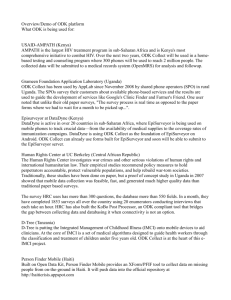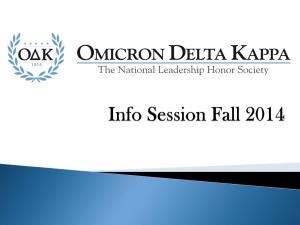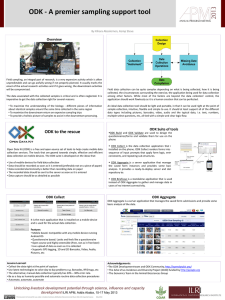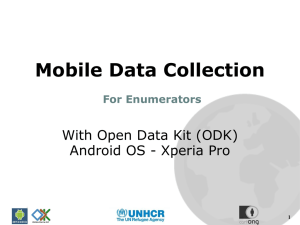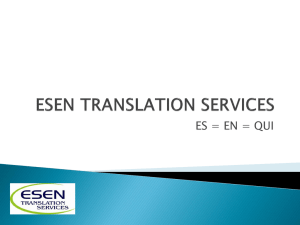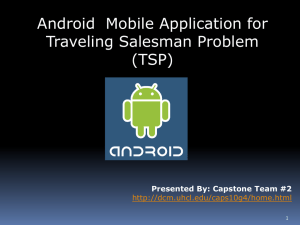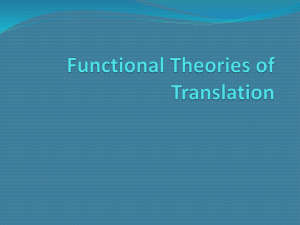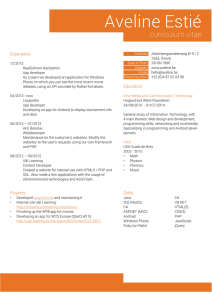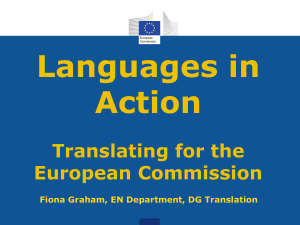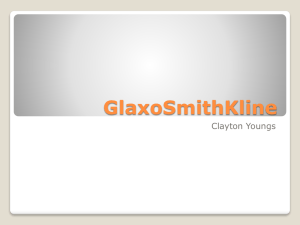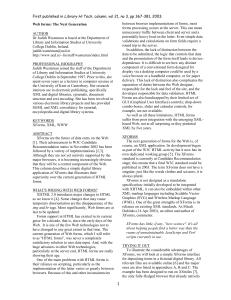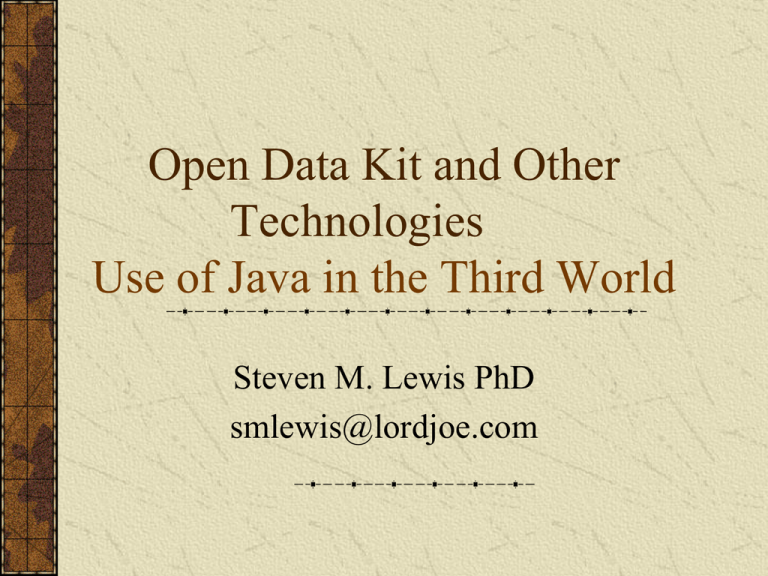
Open Data Kit and Other
Technologies
Use of Java in the Third World
Steven M. Lewis PhD
smlewis@lordjoe.com
Computation and the Third World
Information technology has changed our
lives
That technology has not penetrated the third
world to the extent that if penetrates out
lives
The constraints of developing for the third
world are different
Challenges for the Third World
Connectivity cannot be assumed.
Power cannot be assumed
Services cannot be assumed
Money is a huge issue
Literacy cannot be assumed
Connectivity cannot be assumed
Many Villages are not wired
Wireless may be the only communications
Even this may be unreliable
Power cannot be assumed
Power may not be available
Even when available it may not be reliable
Services Cannot Be Assumed
Systems placed in villages will not be
maintained
Parts will not be available
The knowledge to repair any issues cannot
be assumed
Money is a huge issue
The cost of a laptop is more than the
average yearly income in many countries
In India a cell phone can be bought for $12
A village might have a single cell phone
Literacy Cannot be assumed
What Device is going to have
Impact in the third world?
??
?
Cell Phone Advantages
Very Portable
Cheap and getting cheaper
Solves problems with intermittent and
rarely available power
Automatically solve the problem of
connectivity
Is sealed, self contained, rugged and very
reliable
Moral Today we talk about mobile devices as the
wave of the future.
In the third world they are the only widely
available computing platform
Effective solutions today need to consider
the cell phone as the primary platform.
Problem – Matching Fish to
Markets on the India Coast
Problem – Fishermen in India can deliver
their fish to one of several markets
If a market has more fisherman than buyers,
the price for fish will be very low
If there are few fisherman and many then
the price will be high
Spread of Cell Phones
Effect of Cell Phones on Fish Prices
Moving Away from Paper
Community Health Workers
17
Must bring health care to people
First line of defense
Routine, regular home visits
Know their community
Eyes and ears for local health
Provide education for best practices
Current methods
18
Little, if any, supervision
Paper-based forms – ad hoc design
Long time-lag to usable data
No historical data
Our Goals
19
Standardization of data
Rapid data aggregation and
analysis
Supervision of CHWs
Connection to health records (OpenMRS)
CHW + phone => Flexible, efficient platform for:
Better home care (checklists, protocols, etc)
New outreach programs
Outbreak detection
Improved disease surveillance
Open Data Kit
20
Open-source data collection tool kit
Collaboration between Google & UWashington
Forms + GPS + Picture + Barcode + Audio + Video
…
Initially targeted at public health applications
Current deployments in Uganda and Kenya
http://code.google.com/p/open-data-kit
Open Data Kit Toolset
21
Collect – Android client for data entry
Aggregate – App Engine server for data collection
Submit – multi-transport layer async data transfer
Manage – remote management tools for config
Tasks – assignment of tasks to specific workers
DB – connect forms to existing DBs for browse/update
Viz – visualization of data on graphs/maps
Super – supervisory dashboard for mobile supervisors
Planner – day planning tools for workers
SMS – communication/notification with community
Open Standards –in Java
22
Xforms – W3C
Same data collection forms can run on any platform
Standard HTTP client/server APIs
Allows for different server implementations
Android
Open source platform with multiple implementations by
different vendors (HTC, Samsung, …)
Example: DataDyne/Episurveyor & Open Data Kit
Same forms (but different capabilities)
Data can be submitted to either server
Allows deployments to use mix of platforms
ODK Collect
A tool build on top of XForms
Using JavaRosa (XForms for Mobile
Devices) for data collection and submission
on the Android
What is XForms
XForms is an XML standard developed by
W3C for specifying Forms in XML
Example
Oberon forms
JavaRosa: XForms on Mobile Devices
JavaRosa
Supports a supports a subset of the xform
standard
Questions are asked one per screen
Supports many phones
Written in Java ME
Open Data Kit- ODK Collect
Android library written to support JavaRosa
Forms.
Supports Standard Types – text, number
date, select, multiselect
Supports Bar Code, Picture, GPS inputs
Supports upload to a server running ODK
Aggregate
A Little About The Android
Android should be on Java
Developer's Radar
Its native language is Java
It supports full JDK 1.6
The platform is open source
Well known tools such as Eclipse and
IntelliJ have Android plug-ins
Application distribution is much less
controlled
Build it and they will come!
ODK Form demonstration
Form Elements
Language Section
Define Keys for all Supported Languages
Instance Section
Define Structure of the data
Binding Section
Annotate requirements
Define Conditions
Input Section
Define Controls
Language Section
<itext>
<translation lang="english" >
<text id="Male" ><value>Male</value></text>
<text id="Female" ><value>Female</value></text>
<text id="Sex" ><value>Sex</value></text>
</translation>
<translation lang="german" >
<text id="Male" ><value>M&#xfffd;nnlich</value></text>
<text id="Female" ><value>Weiblich</value></text>
<text id="Sex" ><value>Sex</value></text>
</translation>
</itext>
An Aside on Translation
Google has a very nice API for translation
Machine translation is good for a first cut
Is also good for field use where a translation
is needed and not translator is available
Automatic tools to add needed entries to
multiple language bundles are easy and
worthwhile.
My tools build the language section from
language bundles
Translate Code
import com.google.api.translate.Translate;
import com.google.api.translate.Language;
public static final String WEB_SITE =
"http://code.google.com/p/i18n-translator/";
public String[] translate(String[] input, Language from,
Language to) throws Exception
{
Translate.setHttpReferrer(WEB_SITE );
System.setProperty("http.proxyHost", "proxy");
System.setProperty("http.proxyPort", "8080");
return Translate.execute(input, from, to);
}
Instance Section
<instance>
<Student2_Registration>
<Name/>
<Sex/>
<FemaleQuestions>
<StartedMenstruating/>
<Pregnant/>
<StartMensesAge/>
<Child jr:template="">
<Name/>
<Sex/>
<Age/>
</Child>
</FemaleQuestions>
<MaleQuestions>
<Circumcised/>
<MasterbationRate/>
</MaleQuestions>
...
Binding Section
<bind nodeset="/Student2_Registration/Name" type="string"
required="true()" />
<bind nodeset="/Student2_Registration/Sex" type="select1"
required="true()" />
<bind nodeset="/Student2_Registration/FemaleQuestions"
relevant="selected(/Student2_Registration/Sex, 'Female')"
/>
<bind nodeset="/Student2_Registration/MaleQuestions"
relevant="selected(/Student2_Registration/Sex, 'Male')" />
<bind nodeset="/Student2_Registration/Birthday"
type="date" required="true()" />
Input Section
<input ref="/Student2_Registration/Name" >
<label ref="jr:itext('What_isYourName')" />
</input>
<select1 ref="/Student2_Registration/Sex" >
<label ref="jr:itext('What_isYourSex')" />
<item>
<value>Male</value>
<label ref="jr:itext('Male')" />
</item>
<item>
<value>Female</value>
<label ref="jr:itext('Female')" />
</item>
</select1>
...
Tools
PurcForms a GWT based tool for editing
XForms
ODK Forms Designer a GWT tool
specifically targetted to ODK
Annotation Based Generator
ODK Aggregate
Infrastructure for Storing results
Build on top of Google App Engine
Demo http://lordjoedev.appspot.com/
Deployments
44
Kenya HIV,
300 CHWs
Tanzania e-IMCI, 5
clinicians
Sample Applications
Sample Applications
Sample Applications
Crisis Management - Haiti
Person Finder Demo
http://haiticrisis.appspot.com/
Person Finder Results
Other Applications
Open MRS
Patient Search
Open MRS
Demo
I-Tech
I-Tech (International Training and
Education Center for Health
Health Workforce Development
Operations Research and Evaluation
Prevention, Care, and Treatment of
Infectious Diseases
Health Systems Strengthening
http://www.go2itech.org/what-we-do
Where is the Java?
MRS and LIMS
“In every country where I-TECH works, health
needs and program goals are best met when local
laboratories and services are reliable, consistent,
and readily available.”
Electronic Medical Record Systems (MRS)
Laboratory Information Management Systems
(LIMS)
[ http://www.go2itech.org/what-we-do/heathsystems-strengthening/laboratory-systemsstrengthening/laboratory-systems-strengthening ]
Summary
In the first world the cell phone is the wave
of the future
In the third world the cell phone is currently
the main line computing device.
Cell phones can make a huge difference in
the absence of viable alternatives.
The University of Washington has a very
active program in this area
Getting Involved
Work with the CHANGE group at the
University of Washington
Subscribe to the developers mailing lists for
ODK and JavaRosa
Contribute time and code.
Project Links
Open Data Kit
Open MRS
University of Washington Change Center
Crisis Mappers
ODK Use
Demo
http://demo.openmrs.org/

